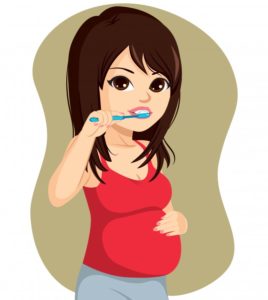Why Oral Care Can Have a Big Impact During Pregnancy
October 4, 2022

Expecting mothers have a lot on their minds, from following a well-balanced diet to avoiding too much sugar. These are just a couple of the many dos and don’ts centered around one important concept: everything a mother does affects the child growing inside her. The same goes for a mother’s oral health! Pregnancy can lead to dental problems, which then result in subsequent issues that can impact the baby. Keep reading to learn a few of the best dental practices pertaining to pregnancy and oral care.
Brush Twice a Day with Fluoride Toothpaste
During pregnancy, hormones can affect teeth and gums, leading to dental problems for some women. Brushing regularly is very important to prevent common issues like tooth decay. Be sure to floss daily, too.
Visit a Dentist to Prevent Gum Disease
It is believed that nearly one-fifth of all premature births could be linked to severe gum disease. Research has found a connection between gum disease and low birth weight. Your dentist can treat gum disease during pregnancy.
Eat Healthy
Tobacco and alcohol should be avoided throughout pregnancy but eating a healthy diet while limiting food and drinks high in added sugar is also very beneficial.
Try To Plan Ahead for Dental Treatment
If you plan on getting pregnant, discuss any needed treatments with your dentist beforehand. If needed, non-urgent procedures can often be performed after the first trimester. Always tell your dentist if you are pregnant.
Watch Out for Gingivitis
This gum infection is more likely during the second trimester. Untreated gingivitis can lead to periodontal disease and even tooth loss. Pregnancy epulis is another gum issue to be aware of, so definitely do your research and talk to your dentist.
Be Mindful of Vomiting
Vomiting can damage teeth. If you are vomiting, avoid brushing your teeth immediately afterward, but rinse your mouth with water and follow up with a fluoride mouthwash. Wait for more than an hour to brush.
Watch Out for Food Cravings
If you have cravings for sugary snacks, it’s best to avoid them since they may increase your risk of tooth decay. Seek out foods low in added sugar, or at least go with fresh fruit. Then brush your teeth afterward.
Increase Your Calcium and Vitamin D Intake
Getting plenty of calcium during pregnancy will protect your bones and the needs of your developing baby. Vitamin D will help your body utilize that calcium. Small amounts of sun exposure will support your vitamin D levels.
There are so many ways you can support your baby during pregnancy, and many of them relate to your oral health. Obviously, your obstetrician will have most of the answers you seek, but don’t hesitate to ask your dentist about these oral health issues, as well!
About the Author
Dr. Melissa Rozas earned her dental doctorate from the University of Texas School of Dentistry in Houston. She is certified by the American Board of Pediatric Dentistry. Dr. Rozas is a member of the American Dental Association and was president of the Texas Academy of Pediatric Dentistry for two years. To learn more about the connection between pregnancy and oral care, schedule an appointment with Dr. Rozas. You can book one on her website or call (972) 393-9779.











